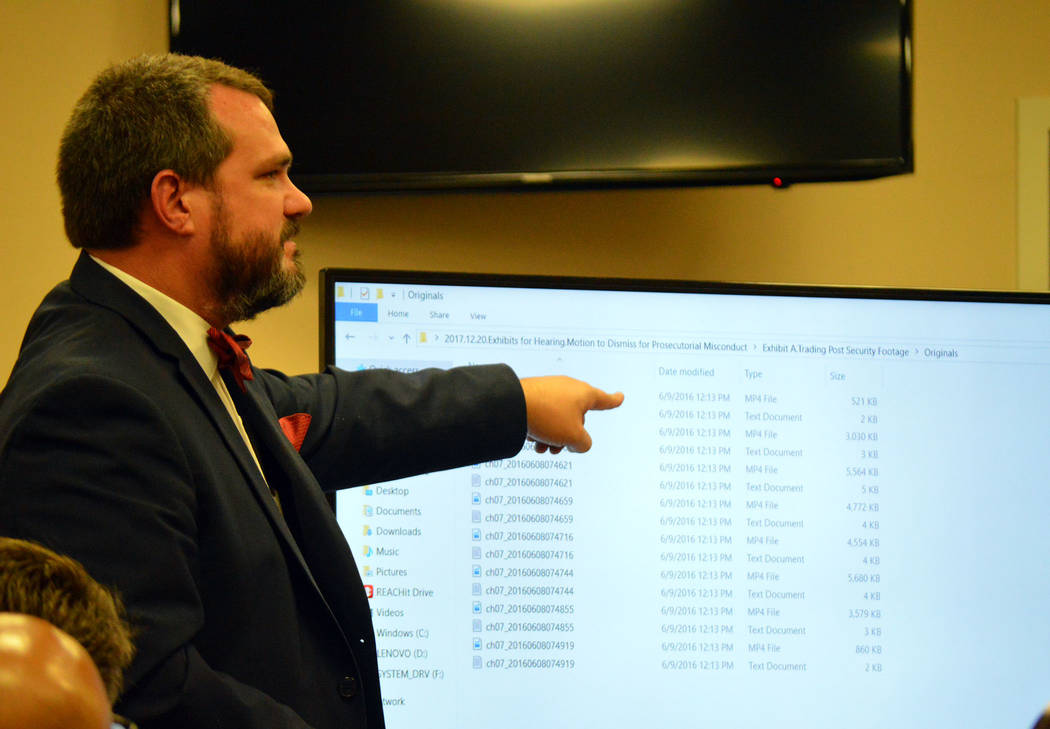
The defendant’s motion to dismiss for prosecutorial misconduct has been denied in Boulder City’s case against a resident for interfering in a police-sanctioned activity.
In his written ruling filed Jan. 4, Boulder City Municipal Court Judge Victor Miller said the court found no signs that false evidence had been manufactured or that the prosecution withheld any “exculpatory evidence” related to dashboard camera footage of the arrest.
He also wrote that equipment malfunction could be the reason there were gaps in the audio of Boulder City Police Sgt. John Glenn’s dashcam video that was provided to the defense.
Boulder City resident John Hunt was arrested June 8, 2016, for repeatedly walking back and forth in a marked crosswalk to protest a police-sanctioned pedestrian enforcement detail. Stephen Stubbs, an attorney for Hunt, claimed the audio gaps showed the video had been altered.
“This means we go to trial on March 15,” Stubbs said of Miller’s decision.
Stubbs had filed the motion to dismiss the case Nov. 21.
Miller heard Stubbs’ arguments as well as the prosecution’s arguments in a Dec. 20 evidentiary hearing.
Video contradictions
At that hearing and one held Dec. 6, Stubbs presented new evidence that seemed to contradict the dashcam video provided by the Boulder City Police Department to the defense.
He also presented expert witness testimony about the authenticity of the dashcam footage provided to the defense.
The new evidence was dashcam video provided by the Nevada Highway Patrol through a subpoena. The footage was from an NHP officer who was with Glenn when he made the initial arrest.
Both Glenn’s and the NHP officer’s dashcam footage contained audio from two microphones that were together at the same time, capturing the same event. They should have contained the same audio, but they did not.
Different audio
In Glenn’s dashcam video, the first time Hunt speaks to officers after being detained, he says “No.”
According to the NHP video, after Hunt is handcuffed by officers, he asks them if he is being detained. Then he says, “No,” and asks again if he is being detained.
He is then told he is not being detained but rather being arrested. He then asks officers what he is being arrested for and is told for obstructing traffic and resisting arrest. This portion is present in both Glenn’s dashcam video and the NHP one.
The NHP video includes Hunt asking the officers, “How can I resist something that I’m not aware of?” after being told why he is being arrested.
Glenn’s dashcam video has no dialogue from Hunt during that time.
Dialogue gaps
During the Dec. 20 hearing, expert witness Arlo West of Creative Forensic Services said he found more than 81 gaps in Glenn’s dashcam video, according to Miller’s ruling. Additionally, Miller said, West conceded that the gaps in the audio “could be caused by radio/cellphone interference and equipment malfunction.”
West also said the dialogue from the NHP recording should have been heard in Glenn’s if it were authentic and that it was highly possible the audio was masked.
“The court finds that it is more believable that such a large number of ‘gaps’ are caused by natural occurring anomalies in this older dash cam system rather than intentional manipulation,” Miller wrote in his ruling.
According to West, masking is re-recording audio after it has been redacted, edited, obscured or removed.
“I guess that Judge Miller thinks that the universe aligned and these malfunctions took out specific and important audio that is not in John Glenn’s recording but in the NHP video,” Stubbs said. “We have to live with that decision.”
Miller also wrote in his ruling that no one at the city had the knowledge to separately edit the audio and video portions of the dashcam footage.
“To do as the defense suggests, someone would have to be knowledgeable enough to know that the audio could be separated from the video and separately manipulated,” he wrote. “The court just cannot find that Sargent (sic) Glenn, anyone else in the Boulder City Police Department or the City Attorney’s office were capable of such activity.”
The city originally dropped the charges against Hunt in late June 2016 but refiled them on June 5, 2017. Less than a week before, on May 30, Hunt’s attorneys brought a federal complaint against the city and the police department, accusing them of malicious prosecution, abuse of process, false imprisonment, negligence, assault and battery.
Contact reporter Celia Shortt Goodyear at cgoodyear@bouldercityreview.com or at 702-586-9401. Follow her on Twitter @csgoodyear.